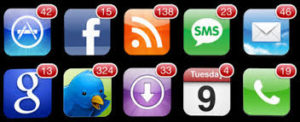MY DIGITAL DETOX
In July – for the first time since I launched my own business – I went on vacation for a week and left my laptop and smartphone behind. After all, I can’t keep talking about the importance of an occasional digital detox during my talks and workshops without doing it myself. I have to practice what I preach! So how did I find the experience?
I’ve been running my own business for three years and I’m very pleased with the way my ‘third baby’ (I have two daughters) is developing. So far, so good. However, this also means that I have a busy life, since I work four days a week, have two young children, a husband, elderly parents, my friends, our new house, sports and everything else that is important to me. As a stress coach, I am very aware that when you have so much to do, it is essential to also take time to relax and recuperate and to simply enjoy the moment.
Equally, I always tell my clients during my talks and workshops about just how vital it is to not always be online – in other words: to free yourself from the state of digital dependence that we all find ourselves in to a greater or lesser extent. Hence, there were two good reasons to try my own digital detox. In the second half of July, I spent a week in the mountains with my husband and our daughters (aged almost 6 and 8) – and I went without my laptop and smartphone. After all, if something is worth doing, it is worth doing properly! I have to confess that I felt a bit uneasy when shutting down my computer and turning off my smartphone on the Friday evening before we left. I wondered if my clients would be understanding (I also offer crisis coaching – and an urgent issue could arise…). Would I lose mandates because of this? Could I enjoy a relaxing vacation without knowing what was happening with my business?
Completely relaxed without work e-mails
I was surprised myself: I didn’t find it at all problematic that I couldn’t read my work e-mails, view my LinkedIn profile or check how many people had visited my website. I was completely relaxed! This was perhaps also due to the fact that during previous vacations, I had just glanced at my e-mails in the morning and evening and only answered them if necessary. I had recorded an out-of-office message on my voicemail, asking people to contact me via e-mail for any urgent enquiries. This meant that in work terms, I was already semi-offline during my vacations. As a result, going completely offline this time was a much smaller step than I had anticipated. And I benefited from it immensely: I was able to spend more time with my husband and my children – but I also had more time for myself, e.g. to read – an activity that I love but often neglect in my daily life. I also was able to enjoy being outdoors without always viewing it through the lens of my smartphone – meaning I was less distracted and really lived for the moment. This was a clear win!
There was one thing that I totally underestimated: The number of times that I would have used my smartphone for non-work purposes each day if I’d had it with me – from checking the weather (which was very changeable during our vacation, to put it mildly) and looking for alternative activities when it was raining, to booking tables in restaurants, etc. Since my husband had taken his mobile phone with him, he had to do all that himself. That made me feel stressed rather than relaxed (and him too…!) Nowadays, we do so much online – even when on vacation: You rarely find printed brochures for guests in hotels and holiday apartments now. Instead, you increasingly receive an e‑mail with a link to all the personal information you need before setting off – and if you don’t have your smartphone with you, you lose out!
A valuable experience – with one adjustment
I also missed not staying in touch with my friends via WhatsApp or SMS, even if I have become aware that it can sometimes be stressful always having to promptly respond to messages – or feeling that you have to answer them since people can see on WhatsApp when a person has read a message. And since I had submitted a bid on an online platform to purchase a bike for our younger daughter shortly before leaving on vacation, I returned to find a number of text messages from the seller, saying that he was unable to reach me … Though fortunately, he was patient in the end and had not sold the bike to another buyer. I have to admit that once (and it really was just the once!!!), I used my husband’s mobile phone, since the birthday of my best friend – who is also the godmother of our elder daughter – happened to fall during our vacation and it was important to me and her godchild to speak to her on the day rather than wishing her happy birthday a week later. You have to know when to set your principles aside!
My own personal conclusion is: I don’t have any problem about going on vacation without access to work e-mails. However, I find it (even) more relaxing if I take my smartphone (which is intentionally configured so that I don’t receive work e-mails) with me for logistical reasons and so that I can keep in touch with friends. In future, I will continue to leave my laptop at home but will take my phone with me when I go away. I will consciously avoid checking social media (I only have a LinkedIn account – I’m not on Facebook), which many people find addictive. However, I won’t sacrifice the flexibility that my phone gives me when it comes to organizing my vacation (and daily life) and communicating with people socially (which I prefer to do offline – but online is better than nothing)!
BUT…
I don’t want to generalize: What works for me may not work for everyone! If you automatically receive work e-mails on your smartphone, you may find that you can’t simply ignore them if you also make personal use of your phone – that requires a lot of discipline! We all need to discover the best form of digital detox for ourselves – whether it is a hard or soft detox over a weekend or during your vacation. The key thing to remember is: Try it once to see how you find it – and to become aware of the number of times you go online each day and the channels you use. Recognizing your habits is the first step towards making a change.
P.S. If you find it difficult to remain offline, there are apps you can use to combat your addiction to your smartphone. The following article by Burkhard Heidenberger from his interesting newsletter lists some of the options available to you: http://www.zeitblueten.com/news/apps-gegen-smartphonesucht/ (only available in German).
© Claudia Kraaz





